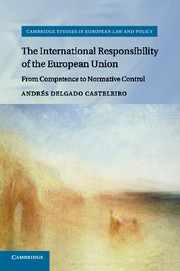Book contents
- Frontmatter
- Contents
- Series Editors' Preface
- Acknowledgements
- Introduction
- 1 The EU's Normative Control and International Responsibility
- 2 Codifying of the Responsibility of International Organizations (I): The Impact of ARIO's Rules of Attribution on the EU
- 3 Codifying of the Responsibility of International Organizations (II): The Impact of ARIO's Rules of Responsibility on the EU
- 4 EU Declarations of Competence to Multilateral Agreements: A Useful Internal Reference Base?
- 5 The Apportionment of the EU's International Responsibility in International Environmental Law: The International Application of EU Declarations of Competence
- 6 The EU's Normative Control and International Responsibility: The WTO Dispute Settlement System
- 7 Normative Control in the EU and the Responsibility of Member States: An Analysis of the Responsibility of the EU in International Investment Law
- Conclusions
- Bibliography
- Index
3 - Codifying of the Responsibility of International Organizations (II): The Impact of ARIO's Rules of Responsibility on the EU
Published online by Cambridge University Press: 05 September 2016
- Frontmatter
- Contents
- Series Editors' Preface
- Acknowledgements
- Introduction
- 1 The EU's Normative Control and International Responsibility
- 2 Codifying of the Responsibility of International Organizations (I): The Impact of ARIO's Rules of Attribution on the EU
- 3 Codifying of the Responsibility of International Organizations (II): The Impact of ARIO's Rules of Responsibility on the EU
- 4 EU Declarations of Competence to Multilateral Agreements: A Useful Internal Reference Base?
- 5 The Apportionment of the EU's International Responsibility in International Environmental Law: The International Application of EU Declarations of Competence
- 6 The EU's Normative Control and International Responsibility: The WTO Dispute Settlement System
- 7 Normative Control in the EU and the Responsibility of Member States: An Analysis of the Responsibility of the EU in International Investment Law
- Conclusions
- Bibliography
- Index
Summary
Introduction
As can be seen from the previous chapter, the responsibility relations between IOs and Member States not only pose a challenge to the conceptualization of IOs as international subjects, but also to its Member States. The shift towards global governance entails an entangled web of institutions, mechanisms, relationships and processes among States, IOs as wells as other actors that shows how States are no longer the only subjects in the international arena. The interdependence between the different international actors at the root of the current debates on international law and global governance increases the number of situations where questions of joint or shared responsibility between IOs and States might arise. Moreover, the ARIO's recognition that under certain circumstances a conduct carried out by a State organ or agent might not entail the responsibility of that State, but to the responsibility of an IO instead challenges the State-centred conception of international law. States are no longer the only subjects that can be internationally responsible. IOs, like the EU, can also be held responsible, and in some situations for actions carried out by State organs or agents.
These discussions on the shifting nature of international law and global governance are to a certain extent reflected in the debates concerning the shared/joint responsibility of IOs and/or States under international law. The ARIO devotes its Chapter IV of Part One and its Part Five in its entirety to these issues. On one hand, Chapter IV of Part I ARIO establishes the rules regarding the responsibility of the IO for the acts of a State or another IO. On the other, Part Five tries to answer the classical issue of States’ responsibility for acts attributable to an IO.
While some of the issues will be common to both chapters and could apply equally to other IOs, the special nature of the relationship between the EU and their Member States will raise different types of questions in each of them. In particular, issues surrounding the responsibility of the EU for the actions of a State will focus on the degree of control that the EU has over its Member States and whether a rule of responsibility and not a rule of attribution is the correct approach to tackle the issue.
- Type
- Chapter
- Information
- The International Responsibility of the European UnionFrom Competence to Normative Control, pp. 79 - 109Publisher: Cambridge University PressPrint publication year: 2016



